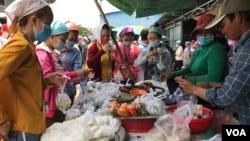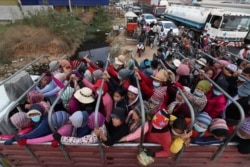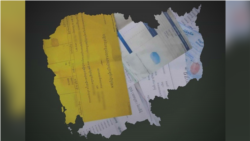Almost all the respondents to a garment worker survey said they were indebted and had to eat less food, take another loan, or sell their land to repay their debts, according to findings released by a local union and two rights groups.
The findings were released in a report published Tuesday by rights groups Licadho and Central, and pro-worker union Cambodian Alliance of Trade Unions (CATU). The survey focused on three factories affected by the COVID-19 pandemic, where operations were either fully or partially suspended.
Of the 162 respondents to the survey, 106 held a microloan which was issued by a microfinance institution or bank. On average, garment workers informed surveyors that their monthly payments for food and debt repayments exceeded their salaries.
“Hundreds of thousands of heavily indebted workers are now out of work, after hundreds of factories suspended their operations, putting them at risk of land loss and other human rights abuses,” read the report.
Ninety-six percent of respondents said debt had made their lives “much worse” or “slightly worse,” with only two percent saying it had improved their situation. The most common reason to take a loan from an MFI or bank was to repay an existing loan, with 73 respondents saying their existing debt liabilities were being paid with new debt.
The civil society groups said this was forcing workers to take the extreme steps of curtailing their family’s food needs, selling their assets or land – an issue already highlighted by Licadho in prior reports – or in some cases taking their children out of school or sending them to work.
Fifteen percent of respondents, according to the research, had already sold their land and another 30 percent anticipated a land sale soon to repay their debt. Licadho has advocated in the past for doing away with the use of land titles as collateral for microloans, which, it said, severely risked the land tenure security of Cambodians.
“The experiences of these 162 people are not representative of every garment worker or microloan borrower in Cambodia,” reads the report. “But we know their struggles are shared by some of the other 2.6 million microloan borrowers in Cambodia, who together held more than $10 billion in microloans at the end of 2019.”
Licadho, land rights NGO Sahmakum Teang Tnaut, youth group Khmer Theravak and pro-worker unions have in the past advocated for government and stakeholder intervention to alleviate human rights violations facing Cambodian borrowers.
But, the government and financial institutions have denied any allegations of human rights infringements or impropriety in the past. These issues have received renewed attention in light of the coronavirus pandemic, which had severely hit the Cambodian economy and affected the lives of Cambodian workers across the spectrum.
VOA Khmer on Tuesday spoke to Phat Phuong, a 24-year-old garment worker at Bowker Garment Factory in Kandal province’s Ang Snuol district, who said she has been suspended from work recently. She had so far received only $30 from her employer and $20 from the government because factory operations had been halted.
Phat Phuong said she has debt from two institutions -- LOLC (Cambodia) and another microloan provider she couldn’t recall. She owed them $60 a month combined, but was only expected to get $70 from the government and factory during the work suspension.
“It is difficult since we are in debt because I also have a daughter to [take care of],” she said. “I have been trying to get money from other sources to repay the loans.”
Kaing Tongngy, a spokesperson for the Cambodian Microfinance Association, alleged that human rights groups were not looking at the bigger picture and were agenda-driven, claiming that MFIs have done a lot to help their victims.
He said it was the duty of borrowers to repay their loans and that MFIs would work with those severely impacted by the economic downturn.
“It is their duty that they take the loan and they need to pay back,” he said.
“Some NGOs have their own human rights-oriented agenda. But if looking at the bigger picture of reality, it is very contradictory,” he added.
According to CMA data, 242,000 people had requested for loan relief, of which 226,000, or $1 billion in loans, had been provided relief in the form of loan restructuring, interest payment deferrals or postponement of all payments.
There was no breakdown or details of the exact nature of this relief or how many garment workers were helped. According to Licadho, there are more than 2.6 million borrowers and more than $10 billion in microloans, revealing that CMA’s relief efforts impacted less than 10 percent of people with MFI loans.
VOA Khmer could not reach the Association of Banks in Cambodia and Chea Serey, director-general of the National Bank of Cambodia, for comment on Tuesday.
Khun Tharo, a program coordinator at labor rights group Central, said the impending onset of European Union sanctions, in the form of a partial suspension of the ‘Everything But Arms’ trade privileges, would further exasperate garment workers’ situations.
“They have forced themselves to sell land and belongings so that they can pay the MFIs,” he said. “It is the state that should help them as they face difficult living conditions.”
Am Sam Ath, the deputy director for rights monitoring at Licadho, said the government and relevant private stakeholders should look at the issue to ensure that workers don’t sell their property to repay or borrow money from private lenders to pay the MFIs.
“[We] need to make sure that they don’t become the victim of forcefully selling the land to pay the banks. And [we] need to make sure they are not more in debt by borrowing from private to pay MFIs,” he said.
The report pointed to increased investments from government institutions, aid agencies, and development banks to Cambodia-based MFIs, such as recent capital infusion from USAID, Australia’s DFAT, World Bank’s IFC, and German Development Bank KfW.
“What Cambodian borrowers need right now is debt relief, not millions of dollars in financing for profitable, foreign-owned MFIs to expand their loan portfolios,” reads the report.






